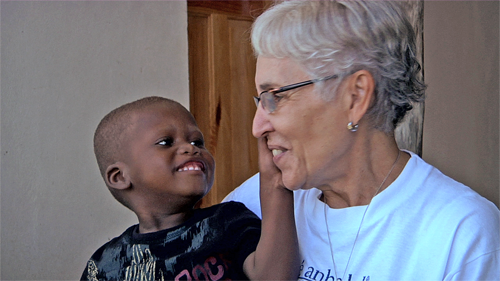
By Patricia Caso/October 30, 2012
Photos by Martina Radwan
We all remember the devastation of the earthquake in Haiti on Jan. 12, 2010. This week we’re seeing images of the damage that Hurricane Sandy has wrought there. I’ve been alarmed to learn that for many of Haiti’s rural population, these massive disasters merely magnify the consequences of their historically dire living conditions.
“Social justice is not just sitting behind a desk and writing about it, but really putting your hands to work.” Rose-Marie Chierici
Fortunately, a group called H.O.P.E. has been creating sustainable solutions for these people under the leadership of anthropologist Rose-Marie Chierici, Ph.D., its co-founder. When TWE offered me the opportunity to interview her about her important work in rural Borgne, I jumped at the chance.
I wanted to find out how she tackles the daunting issues she faces in one of the most remote, impoverished and forgotten towns in the poorest country in the Western Hemisphere! Rose-Marie’s story is inspiring; she is truly putting her hands to work…
EYE: Rose-Marie, under what circumstances did you leave Haiti as a teenager in 1960 and come to the U.S.?
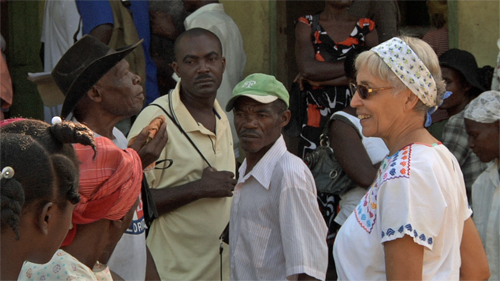
R-M: My father was ushered out because of his political activities. His citizenship was revoked. Moving to Washington D.C. was a difficult transition because very few Haitians settled there at that time. I was very annoyed about having to leave my friends, also losing my identity. I was not sure where I fit in and had to learn the culture and the language.
EYE: Why did you pursue anthropology for your graduate degree?
R-M: I thought it would be a great opportunity to work with my own experience of migration and changing cultures. I wanted to understand why cultures work and what makes people tick.
More importantly I wanted use the skills of an anthropologist to understand and apply my knowledge, reveal social issues and then work to resolve problems rather than just studying people.
” 77% of Haiti is in dire poverty…. 77%!!! Life expectancy is 62. And 51% do not have access to water. How do you crawl out of such an incredible hole?”
EYE: Had you been looking for a way to return to Haiti?
R-M: I was. My dissertation was about the Haitian boat people. They were from a very remote area of Haiti and had settled in Rochester, NY, where I was living. To me, going back to Haiti was a natural thing to do.
Another reason was very personal. My father, an agronomist, challenged the norms because he decided to work with the rural people, which was unheard of. He started the first coffee cooperative, which I later learned is not far from where I work now.
He always believed in social justice. That is his legacy to me and to my siblings. Social justice is not just sitting behind a desk and writing about it, but really putting your hands to work.
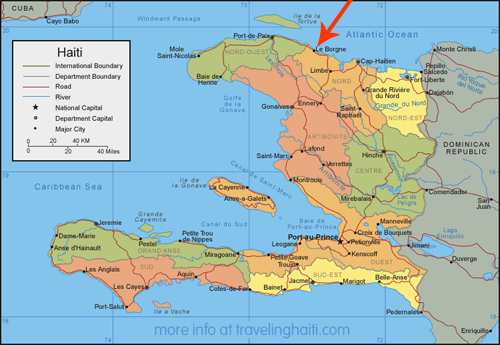
EYE: You started the organization in 1995. Why the acronym “hope”?
R-M: We wanted to have “H”aiti “O”utreach ( original group name) and then “P,” Pwoje and “E,” Espwa which are Haitian Creole for Project, Hope…H.O.P.E.
We wanted to represent the two cultures, U.S. and Haiti, reflecting the partnership with the people of Borgne to enable health, education and economic programs.
EYE: Why did you choose Borgne rather than a major city?
R-M: Rural Haiti is so isolated. Cities have always neglected rural people. Here, they grow fruits and vegetables for consumption in the cities, and they get nothing in return.
When I walk through the villages, it’s like I’m walking back in time….there are no roads, no electricity, no distribution of water except for a couple of wells. Sanitation is totally absent. I can still find people who do not know when they were born.
“There is a group of very courageous women who used whatever little (and I mean little) money they could spare to help women escape violent situations…”
EYE: Tell me about the first time you and six others arrived in Borgne as members of H.O.P.E.
R-M: It was an amazing experience! I was in rural Haiti, a part I did not know at all, where I had no ties, and yet where I found, and do find, myself very much at home.
People were very welcoming. We started a profile of the community’s needs and met with various groups. We came to a common decision on what we were going to tackle and what the community was willing to do. It was a very good start for the collaborative way H.O.P.E. works today.
EYE: What programs have you initiated most successfully?
R-M: The most visible program is the partnership we formed for health care with the Ministry of Health, or ALYANS SENTE BORGNE, ASB. It is very successful! We opened a hospital, are educating the people in health care and built a mobile health unit.
The work we do with the peasant organizations and with education is very dynamic. We work on tree nurseries and community gardens. We built a village bakery on top of one of the worst hills to get to and a grain mill.
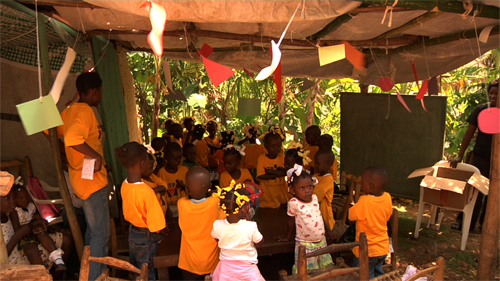
EYE: You say you are worried about women. Is that in Borgne or in Haitian culture in general?
R-M: Both. I am concerned about the oppressive structures that define and limit their options and opportunities, that overly burden them and contribute to the high levels of maternal and child mortality and ill health.
Women in Borgne have little or no access to legitimate microfinancing that does not take every penny they have. They could benefit from that kind of program and also training and brainstorming about potential kinds of productive activities.
Sexual and physical violence are silent killers and sources of anxiety among women and girls and this needs to be addressed. There is a group of very courageous women who used whatever little (and I mean little) money they could spare to help women escape violent situations, but that didn’t go very far. That group could do wonders if supported and encouraged.
“Education is more than just literacy. It’s about empowerment.”
EYE: How did you start to chip away at the education problem?
R-M: It was difficult at first. 80,000 people live in more than 200 villages. The whole educational system is so whacked out. Anyone can decide to build a school. And most of the teachers can barely read or write themselves.
H.O.P.E. thought there would be a benefit for teacher training programs. We worked with 140 teachers by having trainers come in for a week or two. It was a huge undertaking because we also had to house and feed some of these people who lived 7-8 hours away and could not return home.
The next year, because they saw the training worked, the Borgne people took it upon themselves to go to the Ministry for Education and ask for trainers, which they got! That was a huge step!
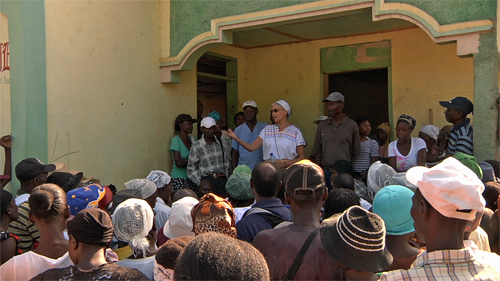
EYE: And you have a vibrant mobile classroom for young children?
R-M: Yes. Education is more than just literacy. It’s about empowerment. Like the health area, we have a totally Haitian staff. There is no foreigner looking over anyone’s shoulder. The Education Director, Margaret, is a powerhouse.
Her dream was to bring education to children in rural areas. Together we worked it out and now we have 400 kids, 4-7 year-olds. But then they move on, and the parents wonder what will happen after we have them for three years. That has to be worked on…
“The doctor stayed with her all night, using every resource he could find to extend her life, one minute at a time.”
EYE: You’ve seen wonderful success with your health partner, ASB? Is there an outstanding moment?
R-M: A young doctor was out with our fledgling mobile clinic. He let us know that there was a desperate situation with a woman. He brought her down to us on a door because they had no stretchers; no ambulance could even get there because there were no roads.
The doctor stayed with her all night, using every resource he could find to extend her life, one minute at a time. She made it! And she went on. Less than a year later H.O.P.E. and ASB, as partners, inaugurated a new hospital with great fanfare. The same doctor was telling the story of this woman when a woman from the crowd shouted, “This is me!”
It was unbelievable. She said, “I walked to be here today.” There you have hope in the face of despair and the sheer will of the staff working tirelessly.
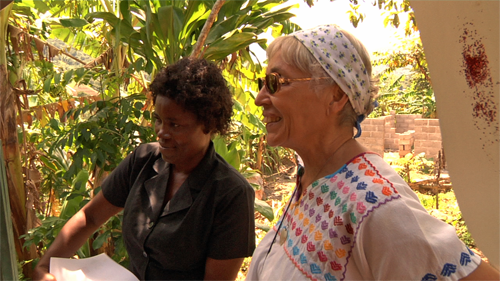
EYE: What drives the passion for your work?
R-M: I was just reading the World Bank statistics. 77% of Haiti is in dire poverty…. 77%!!! Life expectancy is 62. And 51% do not have access to water. Cleanliness of the water is a source of 70% of disease. How do you crawl out of such an incredible hole?
This is the poorest country in the Western Hemisphere. So many of the diseases–malaria, typhoid, cholera–have disappeared from the rest of the world. Here, they still kill people. You cannot turn your back. When I think I am too old and I want to stay home, I cannot turn my back. I don’t have a choice…..
EYE: How has your commitment been possible?
R-M: I’ve been extremely fortunate as an anthropologist—an applied anthropologist—to merge my vocation and avocation in an environment that supports that. My college, SUNY-Geneseo, has never said, “What!? You are going to Borgne again?”
Students have joined me in Borgne every year for the past 15 years. My family has been amazing. My husband has been stellar and unwavering in his support.
“There were tears of joy as Valery set out with his moms for school, and the people on the road cheered him on.”
EYE: You just returned from a recent trip to Borgne. What were the highlights of this trip?
R-M: Lots happened and we moved around a lot–to the Mobile Clinic, Mobile Teacher Program, and the off-base clinic. We met with a mother’s club and with the leadership of the peasant organization and various members of our health and education staff.
Documentarian Bonnie Strauss-Gould was producing a film overview of H.O.P.E. during our trip that will be seen on the internet. She was accompanied by photographer Martina Radwan.
A personal highlight comes from our hospital, and it concerns Valery’s first day of school. Valery (pictured above) is about to be 3-years-old! He was abandoned at the hospital in very critical condition at six-months-old and found with severe malnutrition.
We feared he would not live. Defying the odds, he is an active, well-adjusted toddler, growing up at the hospital! The many mothers and fathers (the hospital staff) love him beyond words. There were tears of joy as Valery set out with his moms for school, and the people on the road cheered him on. Amazing and beautiful! Such a gift of life and pure joy!
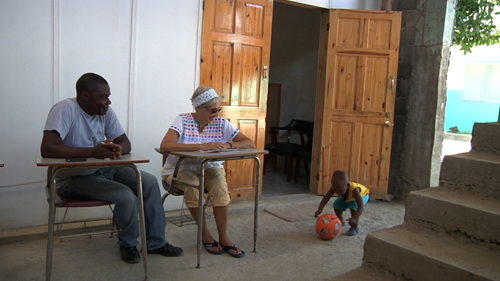
I was most excited about the about the number of women who are giving birth at the hospital. I saw women in labor walking to the hospital. We, luckily, had a vehicle meet them and bring them the rest of the way.
“We are moving forward because people are putting their whole hearts into it, and they could be elsewhere, earning more money.”
EYE: What needs immediate attention at this point?
R-M: We have 400 kids in school and the cost of food for the lunch program has skyrocketed. The tree nurseries program needs supplies. And, we are starting a library at the local school!
EYE: When is your next trip?
R-M: I go over in December with a radiologist and a radiology technician. They are going to examine the facility and help establish a digital imaging center! We don’t even have an X-Ray machine now!
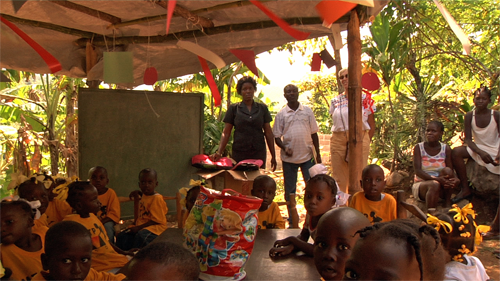
EYE: Would you share a final reflection?
R-M: Perseverance. We are moving forward because people are putting their whole hearts into these programs, and they could be elsewhere, earning more money.
In our first year we were told that 90% of most organizations don’t make it. By the 3rd year, we were told 50% fail. We challenge that!
EYE: Thank you, Rose-Marie, for your inspiration and introducing us to the prospect of what a commitment to social justice can realize. We look forward to the film on H.O.P.E. Continued success to you and your colleagues here and in Borgne, Haiti!
###


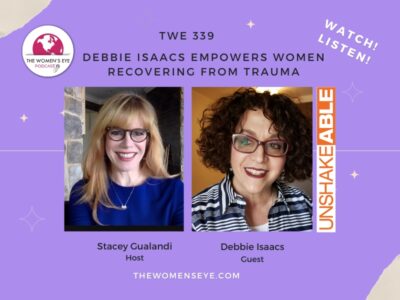
Leave a Reply